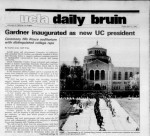Midterm stress is in the air, and the cortisol-powered hustle and bustle is readily palpable. Week five of fall quarter has some students frantically cramming for exams and others hoping their classes get cancelled by some fortuitous fate – wishful thinking, to say the least.
UCLA cancelling classes wasn’t always far-fetched. Our predecessors from 1984 had that good fortune during the inauguration of the incoming University of California president.
The Daily Bruin ran a front-page story on April 11, 1984 describing the measures UCLA took to “gear up” for the inauguration of then-UC President-elect David Gardner. The event took place in our very own Royce Hall. Then-Chancellor Charles E. Young cancelled classes between 10 a.m and noon in order to honor the important event.
Not surprisingly, this prompted criticism from school faculty.
Lecturer Geoffrey Cowan , whose communication class conflicted with the inauguration time, thought it was absurd the university cancelled classes. He thought it was not in line with UCLA’s duty to provide world-class instruction.
“As an educational institution, UCLA’s first responsibility is to teach students,” Cowan said. “I would like to see the time used to contribute to students’ education.”
Cowan specifically questioned whether an inauguration of a UC president was enough to warrant cancelling classes.
“I regret missing the chance to teach,” he said. “With only 20 lectures to cover the course material, two hours fewer works to disadvantage of the students.”
As a result, Cowan was subsequently forced to condense his lecture content that day and play catch-up in his subsequent lectures to compensate for the lost time.
But the UC president had more than incensed professors to spice up his inauguration. An April 13, 1984 Daily Bruin story said Gardner was also treated to a lavish, $50,000 ceremony. The hefty price tag for the inauguration was seen as unnecessary by many, but Gardner proudly defended the expenditure because he believed the entire UC system would benefit from the event.
“The inauguration will serve as a celebration of the meaning of the University and its place in the civilized scheme of things,” Gardner said.
It’s likely Gardner wasn’t celebrating the fact that classes were cancelled when he spoke of the “meaning of the University.”
The new UC president was also received at the event by state and local politicians. Then-California state governor George Deukmejian and then-Los Angeles Mayor Tom Bradley participated in the ceremony and warmly welcomed Gardner into his new position.
Clearly, UC presidents were subject to some serious special treatment in the 1980s. UC presidential inaugurations these days aren’t much of a spectacle, and lavish spending by the president is not easily excused.
For example, UC President Janet Napolitano’s inauguration did not include a fancy ceremony that required the cancellation of classes or the presence of California politicians.
Napolitano received a great deal more heat than her predecessor did when it came to authorizing lavish events. Earlier this year, Napolitano’s office came under fire for approving a UC Board of Regents dinner at San Francisco’s elegant Palace Hotel, which was billed for $17,600 at the expense of the University.
While the UC presidential inauguration has lost a bit of its grandeur these days, the UC can still bank on lecturers and professors getting upset about classes being unnecessarily canceled. Ten weeks go by quickly, and professors need all the time they can get to teach students the course material.
Still, it would be nice to get at least a two-hour break from classes and midterms – even if it is for someone else’s grandiose celebration.

There were complaints at the end of Gardner’s presidency, too:
https://www.deseretnews.com/article/219253/GARDNER-RETIREMENT-BONUS-SPARKS-CONTROVERSY.html